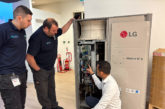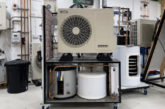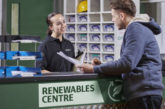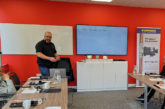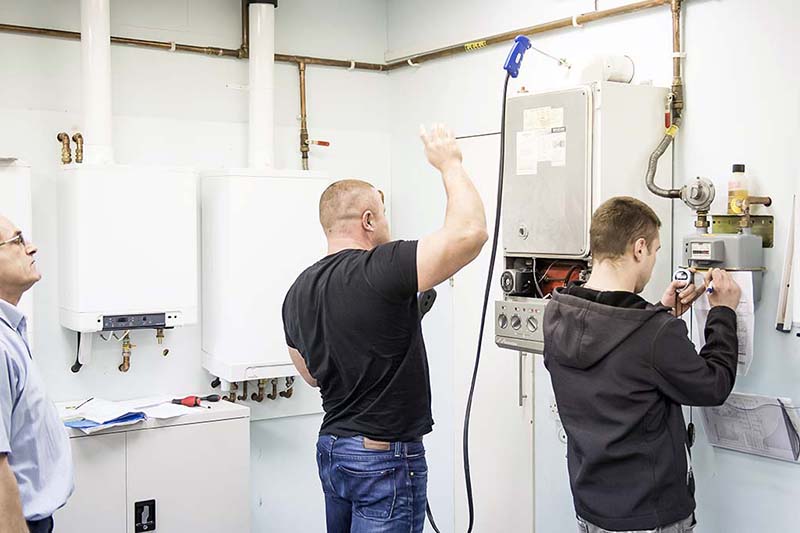
Mark Krull, Director for Logic4training, reports on the results of recent survey which collected views on the changing face of the building services sector from those living and working through it – the installers.
We teamed up with PHPI at the back end of 2021 to find out what installers really feel about the low-carbon future.
Over the next 20 to 30 years, there will be a transition away from gas central heating, with schemes like the Boiler Upgrade Scheme that will see 90,000 new heat pumps installations over three years from March 2022.
There is a lot of debate in the trade and national press about how best to achieve our carbon reduction targets, but we wanted to hear it from the installers on the ground; those who are out on the tools every day installing new heating systems and carrying out repairs and maintenance to ensure people stay safe and warm.
Are they excited about the changes or reticent? Do they see change as a business opportunity or a threat? Are they planning to embrace renewables?
Here’s what we found out…
83% would recommend a career in the building services industry
Installers generally felt positive about building services as a career choice for school leavers, with many stating that there will always be a strong demand for those with heating and plumbing skills, whatever the future brings.
“It’s a great industry with varied elements to specialise in and the skilled tradesperson will always be in demand.”
As a career, building services engineering was praised for its variety and good rates of pay and many installers were confident in a profitable and stable future.
“I enjoy plumbing – it keeps you fit, it makes you think, you travel around and the pay is quite good.”
“Building services engineering has many different and interesting specialisms, rates of pay are pretty good and employment is quite stable.”
However, some felt underappreciated compared to white collar workers and underpaid for the weight of responsibility on their shoulders.
One installer said while they would recommend a career in building services, installers “need to be multi-skilled and salaries must better reflect this”.
There is a strong demand for skilled installers
The skills shortage is an area of concern with increased efforts needed to pull in new entrants of all ages and backgrounds:
“We need good quality well trained engineers for a sustainable future.”
“It is extremely important that an industry which has not always been seen as glamorous or appealing invests in young people. More importantly we should be developing home grown talent so that we can avoid industry skill shortages.”
“With women being offered more opportunities it is a great time to be in this industry, to push this message and help women and girls see how empowering it can be.”
62% of installers are concerned about the Boiler Upgrade Scheme
Unfortunately, the survey results revealed some scepticism about the Boiler Upgrade Scheme, with only 38% of installers viewing it as a positive step.
55% of installers who had so far chosen not to upskill expressed a lack of confidence in government schemes with one installer commenting:
“It’s so hard for business to get access to the grant schemes, leaving it open to bigger companies who then sub the work out, paying poor wages and usually giving the customer a poor job. The government should support smaller business to access schemes more easily.”
Despite this, 44% saw an opportunity in the Boiler Upgrade Scheme and said they planned to develop their business as a result.
More than half of installers are embracing renewables
54% of installers have already trained in heat pumps and/or renewables or plan to in the future.
Of those who had upskilled or planned to, heat pumps were by far the most popular option (91%), followed by solar thermal (47%) and solar PV (26%).
Electrical energy storage was also a popular choice, with 20% of upskilling installers choosing this emerging technology.
Others saw greater value in gas for the time being:
“The transition from gas will take many decades and there will still be a requirement for competent persons in this field.”
91% of upskilling installers chose heat pumps but they are not seen as a blanket solution
Heat pump technology was recognised as an important part of the future heating mix and 91% of upskilling installers chose heat pump training courses.
However, many installers disagreed with the view that heat pumps are a viable solution across the board, illustrating the nuance of the decarbonisation challenge.
“Renewables may work for new builds but how will this be implemented in Victorian or Edwardian homes or multi occupancy buildings?”
“I do not believe retrofitting heat pumps into older poorly insulated buildings is practical. Bringing the thermal performance of old housing stock up to standard should be addressed first. Only then can you look at cost effective renewable solutions that operate on lower temperatures.”
“As a business we will have to move with the times but electric heating and inefficient heat pumps are simply costing the British consumer more than they can afford.”
There is hope for hydrogen
Hydrogen was mentioned across the survey as a fuel with great potential to decarbonise domestic heat in a cost-effective way.
“There is a future in the gas industry but it hinges on the use of hydrogen as a replacement fuel, rather than air source heat pumps, which the majority of homeowners can’t afford.”
The changing face of the heating installer
The survey revealed that heating and plumbing engineers are in high demand and will continue to be as we transition to low-carbon heating. One day we will reach a tipping point where heating installers will have no choice but to upskill, but we are not there yet.
There is always a certain amount of trepidation during times of change and the survey demonstrated this. With so many building service engineers at or near retirement, we need a strong supply of new entrants together with quality training programmes to ensure building services engineers have the variety of practical skills and experience necessary to navigate the technologies of the future.
It’s great to see the majority of installers taking a positive approach to new technologies, seeing change as a business opportunity and remaining open to a future that is still relatively unknown.




